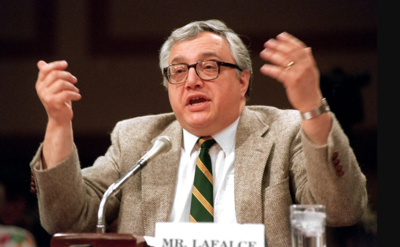- News
- World News
- US News
- John LaFalce, 85, Congressman who pushed for Love Canal cleanup, dies
Trending
John LaFalce, 85, Congressman who pushed for Love Canal cleanup, dies
John LaFalce, a former 14-term US Representative from western New York, passed away at 85. He championed legislation addressing the Love Canal toxic waste crisis and safeguarding consumers from financial fraud. LaFalce also mentored Kathy Hochul, New York's first female governor, and played key roles in the passage of the Gramm-Leach-Bliley and Sarbanes-Oxley Acts.
NEW YORK: John LaFalce, a 14-term former U.S House member from western New York who mentored the state's first female governor and sponsored sweeping legislation to mitigate the Love Canal toxic waste disaster and to protect consumers from financial fraud, died April 11 in Lockport, New York, near Niagara Falls. He was 85.
His death, at a hospice facility, was caused by kidney failure, his son, Martin LaFalce, said.
First elected to the House of Representatives in 1974 as part of a nationwide post-Watergate rebuff to Republican incumbents, LaFalce was the first Democrat to win his district's seat since 1912.
During his 28 years on Capitol Hill, he chaired the Small Business Committee from 1987 to 1995 and was the ranking Democrat on the Committee on Banking (now the Financial Services Committee). He played pivotal roles in the bipartisan passage of two far-reaching bills: the Gramm-Leach-Bliley Act of 1999 (officially known as the Financial Services Act), which eliminated legal boundaries between investment banking and commercial banking, and, in 2002, the Sarbanes-Oxley Act, which targeted corporate financial fraud.
One of his most effective actions as a House member was his response to the environmental calamity at Love Canal, a neighborhood of Niagara Falls, New York. By the late 1970s, a chemical dump there was contaminating groundwater that was leaching into backyards, swimming pools and school playgrounds, causing severe health effects among residents there.
LaFalce and Sen. Daniel Patrick Moynihan, D-N.Y., devised the legal basis for the federal government to clean up the site. Love Canal was the first site to be designated an environmental hazard under the legislation, which created the federal Superfund to mitigate such threats.
Lois Gibbs, a homeowner and civic leader in Love Canal, was quoted in 1991 as saying that LaFalce "was one of the front-runners in getting things done" there.
LaFalce was regarded as a progressive in Congress (getting an "F" rating from the National Rifle Association). He voted against U.S. participation in both the Persian Gulf War and the Iraq War and dissented from President Bill Clinton's welfare reforms because, he said, they would punish the poor. As a practicing Roman Catholic, however, he opposed any extension of abortion rights.
In the early 1970s, as a member of the New York Legislature, LaFalce bucked popular sentiment by objecting to the harsh penalties imposed by what became known as the Rockefeller drug laws, signed by Gov. Nelson Rockefeller. And he objected to casino gambling in New York state on the grounds that it would exploit lower-income people.
Kathy Hochul, who as lieutenant governor became the state's governor in 2021 when Andrew Cuomo resigned, was LaFalce's legislative counsel in Washington in the 1980s. With his support, eight years after he left the House, she won a special election in 2011 to become the first Democrat to represent her western New York district in four decades.
LaFalce "had a profound influence on my early career," Hochul said in a statement this week, "recruiting me from a large D.C. firm" and "putting me on the path to a lifetime of public service."
"I always credited him with getting me the recognition I needed," she said. Under her direction, flags at state buildings were flown at half-staff Monday in his honor.
John Joseph LaFalce was born in Buffalo, New York, on Oct. 6, 1939. His father, Dominic, worked at a grain mill and was a union steward. His mother, Catherine (Stasio) LaFalce, worked at a bakery.
He was the first member of his family to graduate from high school.
LaFalce received a bachelor's degree in history from Canisius College (now Canisius University) in Buffalo in 1961 and a law degree from Villanova University in 1964. He served in the U.S. Army from 1965 to 1967, leaving with the rank of captain.
In addition to his son, Martin, a professor at St. John's University School of Law in Queens, LaFalce is survived by his wife, Patricia (Fisher) LaFalce, and a sister, Lorraine Kenny.
He and his wife had lived in Tonawanda, in Erie County, New York.
LaFalce served in the state Senate from 1971 to 1972 and in the Assembly from 1973 to 1974, when he ran for Congress to succeed Henry P. Smith III, who had announced his retirement. His congressional district encompassed Niagara Falls and northern Buffalo and stretched east to the western suburbs of Rochester.
As a result of the 2000 census, the district was merged with a neighboring one represented by a fellow Democrat, Louise Slaughter. Rather than engage in a hotly contested primary in the newly created district, he decided not to seek a 15th term in 2002. Slaughter was reelected.
End of Article
Follow Us On Social Media









